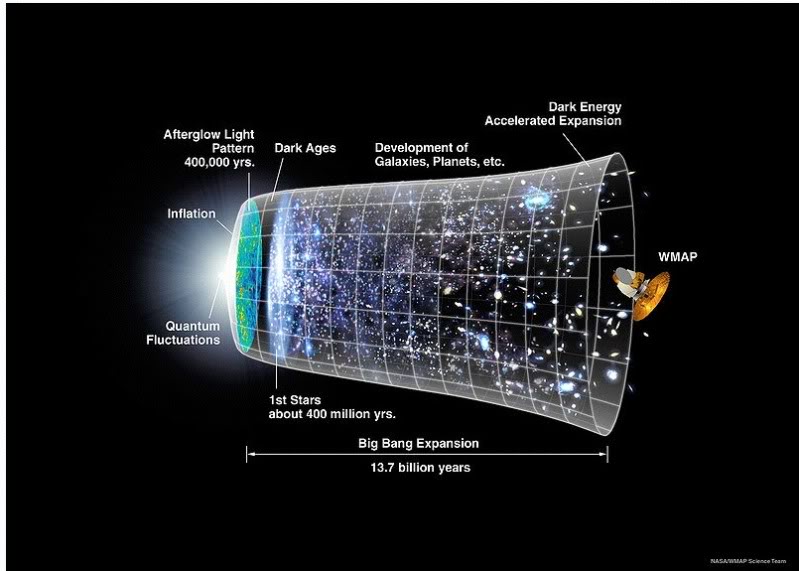"Without cause" defies conception and logic.
But they still happen.
But, "not knowing" is a common experience. Quantum fluctuations are not random.
I would be interested in your explanation that shows how quantum fluctuations are not random.
There may be no local cause, but there is a cause. We just don't know what the cause is.
Which means that there may not be a cause at all, as your assertion to the effect that effects without causes defy 'conception and logic' Â is simply that: an assertion.
The universe did not come into existence without a cause.
As you have pointed out, '" not knowing" is a common experience', so you cannot know this. It may also be the case that the Universe (or our part of a Multiverse) emerged from matter previously existing in a different configuration from what we recognise and understand at present, that is from natural origins through natural causes.
Inflation hasn't been substantiated by observed predictions.
Um, yes, it has. The difficulty for the inflation hypothesis is that those observed predictions do not resolve other problems that leave the hypothesis just that.
'Inflation predicts that the observed perturbations should be in thermal equilibrium with each other (these are called adiabatic or isentropic perturbations). This structure for the perturbations has been confirmed by the WMAP spacecraft and other cosmic microwave background experiments,[52] and galaxy surveys, especially the ongoing Sloan Digital Sky Survey.[54] These experiments have shown that the one part in 10,000 inhomogeneities observed have exactly the form predicted by theory. Moreover, there is evidence for a slight deviation from scale invariance. The spectral index, ns is equal to one for a scale-invariant spectrum. The simplest models of inflation predict that this quantity is between 0.92 and 0.98.[55][56][57][58] From the data taken by the WMAP spacecraft it can be inferred that ns = 0.963 ± 0.012,[59] implying that it differs from one at the level of two standard deviations (2σ). This is considered an important confirmation of the theory of inflation.[52]'
Source:
http://en.wikipedia.org/wiki/Inflation_(cosmology)#
Rather, it's a scientific absurdity recruited to reconcile observations with bad theory. It's nonsensical to then turn around and insist those observations support the absurdity.
No, the observations postdate the hypothesis. Simply declaring something 'a scientific absurdity' does not make it so. What is your better and 'scientifically sound' hypothesis?
It seems that the decoupled photons don't work like photons that move at the speed of light, but instead stayed somehow tethered to give us the CBR.
I see you don't provide the source for your claim. The coupling of photons in the proton-baryon fluid is the 'somehow' that is hypothesised to explain this. This hypothesis may or may not be valid, but simply handwaving it away because you doubt it based on some unspecified reasoning is insufficient to invalidate it.Â
I suppose a number of uncertainties? I didn't realize science worked by putting the burden of proof on the skeptic.
It's not an issue of 'burden of proof', it's an issue with your supposition as to whether or not the Universe constitutes a closed system in the way you seem to imply.
What do you suppose the universe is open to? Where does entropy increase so that it can decrease in other places and form galaxies?
Well, to draw a parochial analogy, do you suppose that entropy can both increase and decrease on Earth, given that Earth is a part of this supposedly closed system in which entropy can only increase? In other words, neither Earth nor galaxies are in and of themselves closed systems. Put simply, the Universe began in a state of low entropy when there was -and still remains - energy which can be 'put to use' by, for example, creating galaxies.
The acceleration of expansion is itself a hypotheses.
Which conforms with observation. So what's your point? That hypotheses which we can test for validity shouldn't be proposed?
Regardless, to invoke anti-gravity as the strongest force in the universe when it doesn't appear to exist in the first place is the height of absurdity. Show me the force of anti-gravity then we can talk about whether it's causing the universe to expand.
The 'fingerprint' of dark energy has been detected:
http://news.nationalgeographic.com/news/2008/08/080811-dark-energy.html
So your dismissal of its hypothesised effects appears to be premature. I agree that understanding the properties of this dark energy is another matter, however, but that it does exist and that its distribution and influence seems to be consistent with the hypothesis that it contributes to the observed expansion of the Universe cannot simply be ignored. Again, what alternative hypothesis would you propose that we can test to explain our observations?
However, practically all of them have to express Atheistic views if they want degrees or jobs in cosmology.
Really? And your evidence for this claim is what, exactly? This website would seem to give the lie to your assertion...
http://www.calvin.edu/~dhaarsma/chr-astro/people.html
(Not because science fiction has any practical value, but because cosmology jobs are pretty limited to academia and government.)
...and you have failed to establish your case that 'Atheistic views' constitute 'science fiction'.
I don't suppose naturalistic explanations are impossible.
Well, you seem to have spent most of your time on this thread railing against them, but maybe my impression is mistaken.
But, I recognize the Big Bang as contrary to our understanding of nature.
By 'our' you seem to mean your own, because it's  not contrary to mine.
And, the only reason I can imagine anyone accepting it is not because of its objective strength, but because of its relative strength to other proposed natural explanations.
Then please present some of these 'other proposed natural explanations' that have 'objective strength'. So far, all you have done is offer us negatives. How about some positives?





 :
: